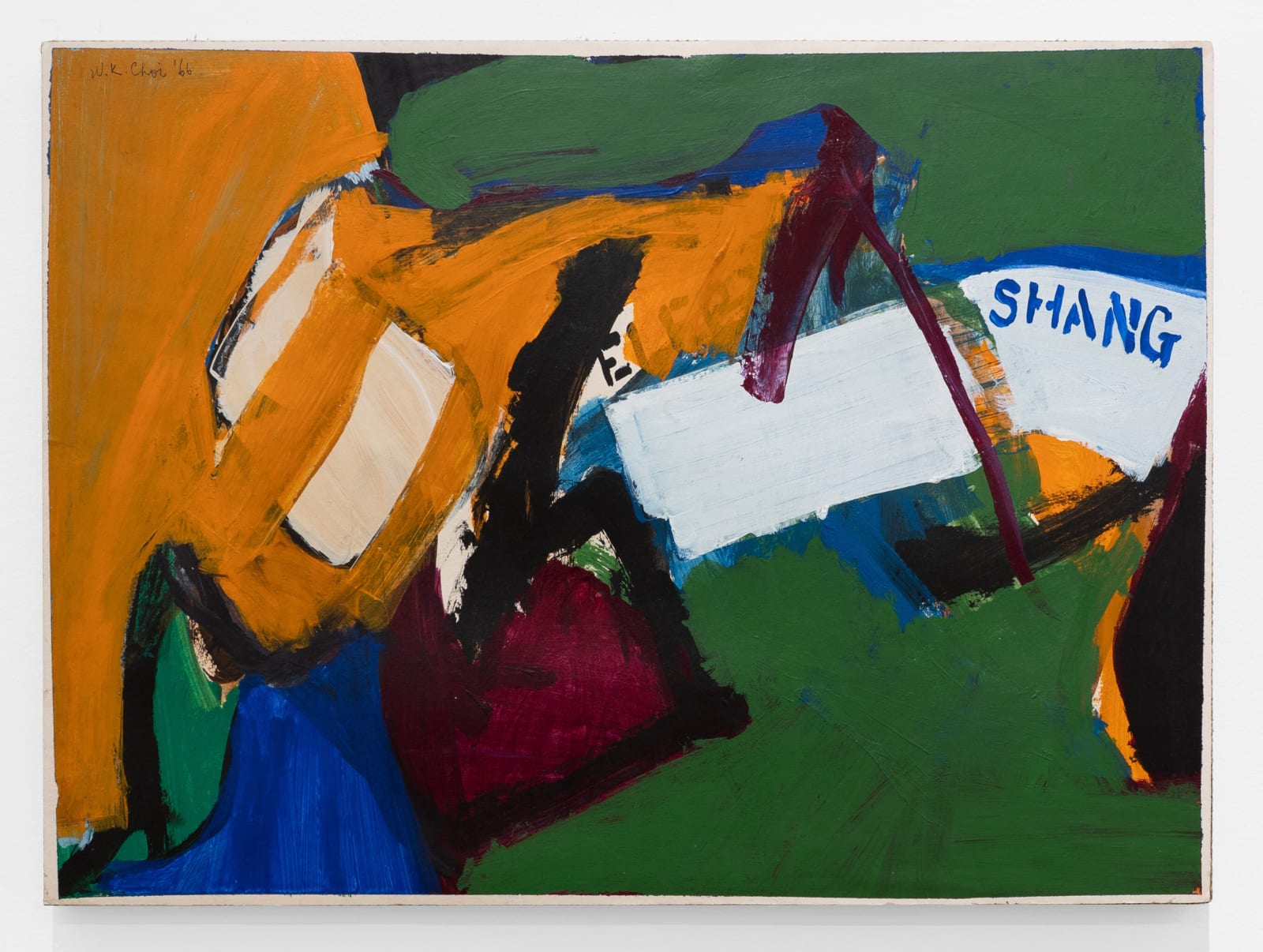-
Artworks





Wook-Kyung Choi
Shang, 1966Acrylic and paper mounted on canvas16 3/4 x 22 1/2 in
42.5 x 57 cmFurther images
Wook-Kyung Choi had an incomparable career as an abstractionist, transforming her experience of the world into energetic brushstrokes and bright colors while resisting clear categorization into any of the emerging artistic movements of the time. While many abstract Korean artists were interested in engaging with the trauma of the Korean War (Art Informel), the theoretical frame of the autonomy of art (Greenbergian), or a return to tradition (Dansaekhwa), Choi had a distinctive self-serving practice of painting and collage. Choi's paintings were informed by the sense of dislocation and loss she felt in her life, and her encounters with racism, the Cold War, the Vietnam War, and new discussions of gender and sex in America. The dynamic nature of her paintings and collage works reflect this conflict – sometimes meditative and melancholy, other times furious and full of anguish. Shang (1966) belongs to Choi's body of work made during her "American Years," a period in the 1960s and 1970s when she lived in the United States and studied art at the Cranbrook Academy of Art and the Brooklyn Museum School of Art. Although Choi never explicitly stated that she was influenced by Abstract Expressionism, her paintings and collages from this period were well aligned with the movement's gestural mark making and bold lines, reminiscent of artists like Willem de Kooning, Franz Kline, and Robert Motherwell. In the 1960s, Choi began to incorporate text into her work, indicating an affinity for other styles that were emerging at the time. Works like Shang (1966) suggest that Choi was aware of Pop artists like Roy Lichtenstein and Jasper Johns, and speak to the breadth of her visual experimentation as she incorporated a diverse range of visual devices in her painting practice.Wook-Kyung Choi had an incomparable career as an abstractionist, transforming her experience of the world into energetic brushstrokes and bright colors while resisting clear categorization into any of the emerging artistic movements of the time. While many abstract Korean artists were interested in engaging with the trauma of the Korean War (Art Informel), the theoretical frame of the autonomy of art (Greenbergian), or a return to tradition (Dansaekhwa), Choi had a distinctive self-serving practice of painting and collage. Choi's paintings were informed by the sense of dislocation and loss she felt in her life, and her encounters with racism, the Cold War, the Vietnam War, and new discussions of gender and sex in America. The dynamic nature of her paintings and collage works reflect this conflict – sometimes meditative and melancholy, other times furious and full of anguish. Shang (1966) belongs to Choi's body of work made during her "American Years," a period in the 1960s and 1970s when she lived in the United States and studied art at the Cranbrook Academy of Art and the Brooklyn Museum School of Art. Although Choi never explicitly stated that she was influenced by Abstract Expressionism, her paintings and collages from this period were well aligned with the movement's gestural mark making and bold lines, reminiscent of artists like Willem de Kooning, Franz Kline, and Robert Motherwell. In the 1960s, Choi began to incorporate text into her work, indicating an affinity for other styles that were emerging at the time. Works like Shang (1966) suggest that Choi was aware of Pop artists like Roy Lichtenstein and Jasper Johns, and speak to the breadth of her visual experimentation as she incorporated a diverse range of visual devices in her painting practice.Provenance
Acquired directly from the artist's estate
Exhibitions
Wook-Kyung Choi, Tina Kim Gallery, New York, NY, 2017
Wook-Kyung Choi, Kukje Gallery, Seoul, Korea, 2016
Wook-Kyung Choi (1940-1985): A Retrospective Paintings 1960-1985, Kukje Gallery, Seoul, Korea, 2005
Literature
Wook-Kyung Choi: American Years 1960s-1970s. Seoul: Kukje Gallery, illustrated p. 35
1of 2
Join our mailing list
* denotes required fields
We will process the personal data you have supplied in accordance with our privacy policy (available on request). You can unsubscribe or change your preferences at any time by clicking the link in our emails.









